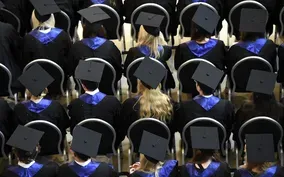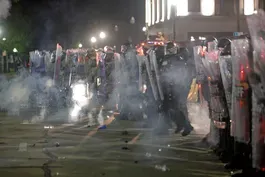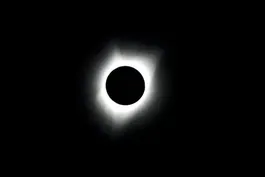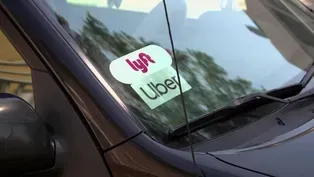
Leigh Ann Caldwell and Stephen Fowler on the GOP and Ukraine
Clip: 4/8/2024 | 9m 7sVideo has Closed Captions
Leigh Ann Caldwell and Stephen Fowler on Ukraine aid, House leadership and the 2024 race
Leigh Ann Caldwell of The Washington Post and Stephen Fowler of NPR join Amna Nawaz to discuss the latest political news, including Congress' packed agenda, the House speaker's attempts to hold together a fragile majority and the presidential candidates try to reach key voting blocs with new messages and policies.
Problems with Closed Captions? Closed Captioning Feedback
Problems with Closed Captions? Closed Captioning Feedback
Major corporate funding for the PBS News Hour is provided by BDO, BNSF, Consumer Cellular, American Cruise Lines, and Raymond James. Funding for the PBS NewsHour Weekend is provided by...

Leigh Ann Caldwell and Stephen Fowler on the GOP and Ukraine
Clip: 4/8/2024 | 9m 7sVideo has Closed Captions
Leigh Ann Caldwell of The Washington Post and Stephen Fowler of NPR join Amna Nawaz to discuss the latest political news, including Congress' packed agenda, the House speaker's attempts to hold together a fragile majority and the presidential candidates try to reach key voting blocs with new messages and policies.
Problems with Closed Captions? Closed Captioning Feedback
How to Watch PBS News Hour
PBS News Hour is available to stream on pbs.org and the free PBS App, available on iPhone, Apple TV, Android TV, Android smartphones, Amazon Fire TV, Amazon Fire Tablet, Roku, Samsung Smart TV, and Vizio.
Providing Support for PBS.org
Learn Moreabout PBS online sponsorshipAMNA NAWAZ: Congress returns from recess this week with a packed agenda and a House speaker trying to hold together his fragile majority.
Meanwhile, the presidential candidates are sharing new messages and some new policies to try to reach key voting blocs ahead of November.
For more on that, let's turn now to Politics Monday, today with Leigh Ann Caldwell of The Washington Post and Stephen Fowler of NPR.
Amy Walter and Tamara Keith are away.
We're glad both of you are here.
Thank you so much for joining us, and welcome.
So, let's start with Congress, Leigh Ann.
Lawmakers, one of their top priorities back - - now they're back in Washington this week is to pass that critical aid for Ukraine that they say they desperately need in their fight against Russia.
The holdup here is in the House.
It's among House Republicans.
Speaker Mike Johnson has a razor-thin majority.
Is Ukraine aid his priority to pass and will he get it done?
LEIGH ANN CALDWELL, The Washington Post: So, Speaker Johnson says that he's going to take it up.
In what form, we don't know.
It's probably not going to be this week, probably next week, but the thing is, is, we don't know exactly what Speaker Johnson is going to do on Ukraine.
He is discussing with the White House, trying to negotiate to try to create a bill that is more palatable to his conservative Republican Conference.
But the White House is insistent that the Senate already passed a bill bipartisan and with 70 votes and that that is the path forward, because the politics are becoming much more tricky as every day passes, not just on the issue of Ukraine from the right, but now on the issue of Israel, which is attached to this bill from some members on the left.
AMNA NAWAZ: So, Stephen, one of the plans we have heard -- and we don't have a plan, as Leigh Ann says -- is, he could separate aid for Israel from aid from Ukraine.
That would allow Republicans who want to back aid for Israel to vote for that and not have to vote for aid for Ukraine.
But it means that they would rely on Democrats to pass Ukraine aid.
And that puts Speaker Johnson in a very tricky position.
He could lose his speakership, or at least be threatened to be removed from his speakership, for that.
How do you look at this?
Is he going to lose his job on this?
STEPHEN FOWLER, NPR: Well, it's certainly a possibility.
I mean, Georgia Congresswoman Marjorie Taylor Greene has a town hall tonight, where she's saying that the majority is unhappy with the way things are run.
And she's threatened his job over the issue of Ukraine and Israel and really how he's handled himself so far.
And so this is a fractious majority.
And this is a majority that individual lawmakers are holding more sway over the issues, but it's not about the issues themselves.
And so what I'm looking at it is this -- what's going to happen with Ukraine aid and Israel aid isn't necessarily about the specific aid to those countries themselves, but more about what this narrow, narrow Republican majority is trying to push itself moving forward and what direction it's trying to go.
AMNA NAWAZ: What is that about that, then, Leigh Ann?
I mean, we have to remember there was a time there was broad bipartisan support for Ukraine to give them whatever they needed in their fight to defend themselves against Russia.
How did this become so political?
LEIGH ANN CALDWELL: It sure did become political.
Part of it is Donald Trump.
Donald Trump has been a voice that has been more skeptical of sending foreign aid to other countries.
That is a part of it.
But then you have the chair of the Republican -- the Intelligence Committee in the House just yesterday, Mike Turner, a Republican, who said that he believes that Russian propaganda has infested some members of the conversations among members of his party, that Vladimir Putin has been effective at pushing those messages that some in the Republican Party and Republican media have adopted.
And so this is becoming a much more tenuous issue, especially as billions and billions of dollars are being requested to send overseas.
AMNA NAWAZ: How do you look at it, Stephen?
STEPHEN FOWLER: Well, I mean, this is a thing where many voters that support Donald Trump resonate.
His message -- Donald Trump's message of focusing more on domestic issues are resonating.
You see immigration as a top issue both in Congress and on the campaign trail.
And, here, you have these two high-profile international conflicts and billions of American spending.
And the conversation has shifted more towards, if we're spending the billions of dollars there, why aren't we spending it here?
And so, with domestic issues in play and with domestic issues at the forefront for a lot of voters, I think that is a more effective cudgel against -- looking at it, instead of thinking about obligations to our allies.
AMNA NAWAZ: And among those domestic issues, we know that abortion access and abortion rights continues to be a chief issue for Democrats in particular.
Just this morning, we saw former President Trump release a video articulating what he says is now his position when it comes to abortion access, saying he believes it should be a state-by-state decision.
Here's more of his message.
DONALD TRUMP, Former President of the United States (R) and Current U.S. Presidential Candidate: Many states will be different.
Many will have a different number of weeks, or some will have more conservative than others, and that's what they will be.
At the end of the day, this is all about the will of the people.
AMNA NAWAZ: Leigh Ann, we also just heard, as Lisa reported, President Biden announcing more student loan forgiveness in Wisconsin.
Why these messages from both these candidates right now?
LEIGH ANN CALDWELL: Yes, it's a great question and great to compare the two messages too.
You have abortion, which is an issue that Republicans have been struggling with.
We saw this in the 2022 elections and some of the 2023 elections.
And Republicans have decided that taking a specific position on a specific ban, a number of weeks, is not politically palatable.
That's why Donald Trump evaded the issue and didn't really come out with a new position.
And then you have Donald -- or President Biden talking about student loans, which is an issue that is really important to young people, people of color as well, who are disproportionately impacted by student loan debt.
And these are the areas where President Biden is suffering among the Democratic base, according to recent polling.
AMNA NAWAZ: Well, let's take a closer look at some of those numbers.
You made that transition for me perfectly, Leigh Ann.
We do have -- in some of the latest polls capturing this moment in time, we see that decline in support among young Americans for Mr. Biden.
This is in the 2020 election.
We saw him then besting Mr. Trump by over 17 points there with voters under 45.
Turn now to what our latest "PBS NewsHour"/NPR/Marist poll shows, President Biden trailing Trump by about one point in that same group.
Stephen, when you look at that, how does President Biden get those voters back?
STEPHEN FOWLER: Well, I think by doing things that were campaign promises, like we have seen today with the student loan debt.
And I think it's also important to realize that both campaigns are relying on their base of voters coming home.
They may not be happy with them now, but once it becomes clear that it's a binary choice between Donald Trump and Joe Biden, most of those people are going home.
So you also have to look at this through the lens of about 100,000 or so people spread among seven swing states that were very narrowly decided, usually college-educated, white suburbanites, and how they view these plans and things.
And so I think that's why you're seeing this now, both with abortion and student loans, is, it's not necessarily for those people, but they're sure paying attention.
AMNA NAWAZ: Well, and other things we're paying attention to, the fund-raising numbers.
I want to get quickly both of your takes on it as well.
We now have March fund-raising numbers from both campaigns.
You see team Biden outpacing team Trump $90 million to $65.5 million.
And when you look at the overall cash on hand for the campaigns, again, you see Mr. Biden's campaign outpacing Mr. Trump's.
Leigh Ann, how do you look at that?
What does that tell us about right now?
LEIGH ANN CALDWELL: A couple things.
Well, obviously it tells us Trump is behind in the money race.
And the money race in the presidential actually matters.
And each candidate is going to have to raise about a billion dollars or a billion-dollar race to get elected usually.
But it tells me that Trump is lacking money in places where it will perhaps matter, including the ground game.
Money is what it takes to have an effective get-out-the-vote effort in all of these states to reach these voters.
Also, Trump has been distracted.
He hasn't spent as much time fund-raising because he has a large number of court cases that he is having to tend to.
And he had a big fund-raiser this weekend where he raised $50 million to try to get him back on track.
But he has a lot of things going on.
And part of -- some of that money is going to pay his legal bills too.
AMNA NAWAZ: We should also say we can't verify some of the claims that they make about fund-raising so far.
LEIGH ANN CALDWELL: Yes.
AMNA NAWAZ: We will be able to later, when the FEC filings come out.
LEIGH ANN CALDWELL: Yes.
AMNA NAWAZ: But, Stephen, what's your take?
STEPHEN FOWLER: I mean, I think it's money spent and money raised on two candidates that have already been president before that are very well-known.
And so, again, it goes back to those swing states and those persuadable voters, that we're just going to see a barrage of money come into play here.
And I think the difference is going to come to who has the most money, like Leigh Ann said, of being able to turn out that particular vote.
AMNA NAWAZ: Stephen Fowler of NPR, Leigh Ann Caldwell of The Washington Post, great to have you both here today.
Thank you so much.
LEIGH ANN CALDWELL: Thank you.
STEPHEN FOWLER: Thank you.
Biden announces new plan to forgive student loan debt
Video has Closed Captions
Biden announces new plan to forgive student loan debt for millions (7m 34s)
A Brief But Spectacular take on painting farmworkers
Video has Closed Captions
A Brief But Spectacular take on painting the people who feed America (3m 16s)
Examining the push to reform the Insurrection Act
Video has Closed Captions
Examining the push to reform the Insurrection Act (5m 40s)
Israeli forces withdraw from southern Gaza as talks resume
Video has Closed Captions
Israeli forces withdraw from southern Gaza as cease-fire talks resume (5m 14s)
Millions of people witness a rare total solar eclipse
Video has Closed Captions
Millions of people witness rare total solar eclipse across North America (8m 50s)
Minnesota on frontline in fight over fair pay for rideshares
Video has Closed Captions
Minneapolis becomes frontline in fight over fair pay for rideshare drivers (5m 44s)
Providing Support for PBS.org
Learn Moreabout PBS online sponsorshipSupport for PBS provided by:
Major corporate funding for the PBS News Hour is provided by BDO, BNSF, Consumer Cellular, American Cruise Lines, and Raymond James. Funding for the PBS NewsHour Weekend is provided by...

















